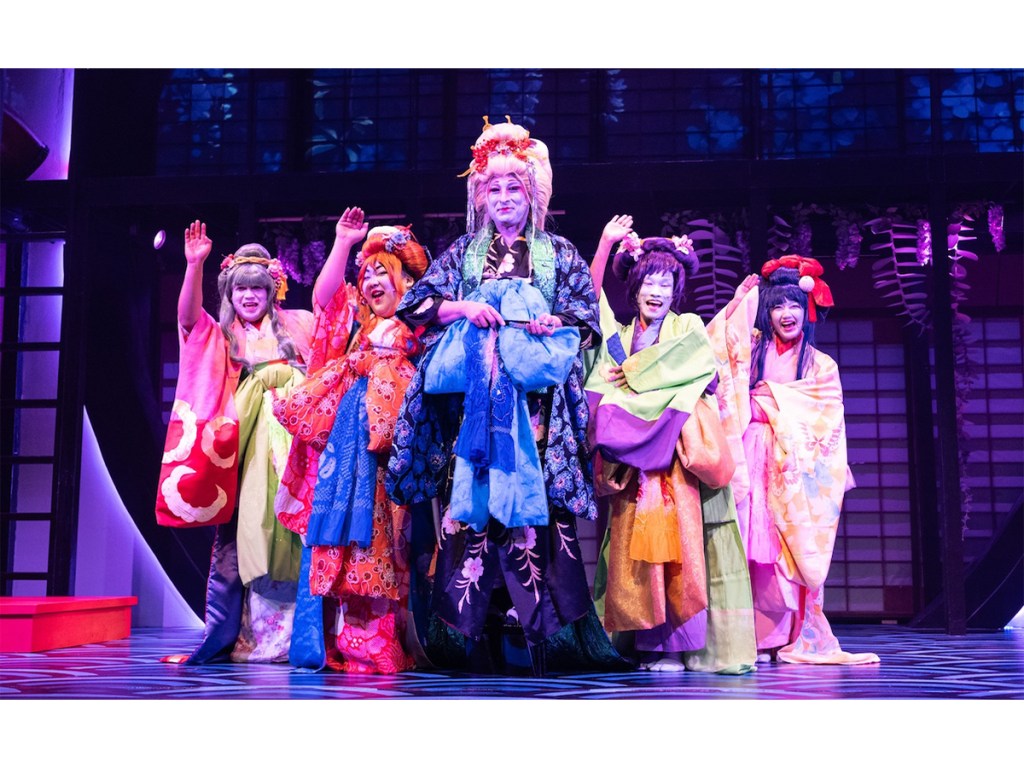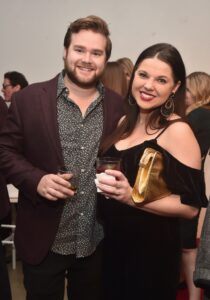East West Players Brings Asian-American Stories Into the Limelight



America’s Cultural Treasures: This article is part of a series sponsored by the Ford Foundation highlighting the work of museums and organizations that have made a significant impact on the cultural landscape of the United States.
Our motivation is enhancing visibility for the AAPI community to show our complexity through the storytelling that happens on our stages, and how we exist in community outside of the stage experiences.
David Nguyen, volunteer, East West Players
When you read the names Sammee Tong, Victor Sen Yung, or Leon Lontoc, you may draw a blank — and that’s by design. These men were actors who mostly performed either bit parts or supporting roles on American network television series that aired during the 1950s and ’60s, never rising to the stardom enjoyed by their White American colleagues. They did, though, have some moments of distinction. Beginning in 1957, Tong co-starred in the situation comedy Bachelor Father, which starred John Forsythe and Noreen Corcoran. He played the role of Peter Tong, who was Bentley Gregg’s (Forsythe’s character) live-in houseboy and valet. Though he was born in San Francisco and raised in California and Hawaii, he spoke with a stereotypically “Asian” accent for his role. However, as the civil rights activist Guy Aoki — the founding president of Media Action Network for Asian Americans, an organization devoted to monitoring mass media for balanced and sensitive depiction of Asian Americans — points out, Victor Sen Yung played Tong’s very Americanized “uncle Charlie.” Both actors went on to several other roles in both television and film. But when Sen Yung is remembered at all, he is typically recalled for his role as Hop Sing, the quick-tempered cook for the Cartwright family, stars of the television series Bonanza from 1959 to 1973. Meanwhile, Lontoc played a character known only as Henry, a chauffeur and valet to a millionaire police captain, on the show Burke’s Law. Later on, he guest-starred in several television shows, with his last credited appearance being on The Brady Bunch.
During that era, the general expectation for many Asian and Pacific Islander immigrants to the United States who appeared in major movie and stage productions was that they would play only secondary and tertiary characters: cooks, valets, houseboys, and servants to middle-class and wealthy White Americans. This status quo seemed to be broken in 1961 when Flower Drum Song became the first major Hollywood feature film with a majority Asian-American cast in a contemporary Asian-American story. It was nominated for five Academy Awards and two Golden Globe Awards, including Best Motion Picture – Musical or Comedy. That the film was made with a mostly Asian-American cast was remarkable considering that at the time, the practice of White actors donning “yellowface” to portray East Asian characters was more common than hiring Asian or Asian-American actors to play ethnically Asian roles. Despite this breakthrough, this state of affairs of well-resourced productions largely ignoring the stories of Asian Americans’ experiences as told from their points of view would continue for at least 30 more years, arguably until The Joy Luck Club premiered in 1993. It would take another 25 years after that debut for Crazy Rich Asians, a commercially successful romcom-drama film with a majority Asian and Asian-American cast, to be produced in the US.
It’s against this historical backdrop that East West Players (EWP) was founded in Los Angeles in 1965 by the performer Mako (born Makoto Iwamatsu in Kobe, Japan), along with Rae Creevey, Beulah Quo, Soon-Tek Oh, James Hong, Pat Li, June Kim, Guy Lee, and Yet Lock. The organization began in the basement of Bethany Presbyterian Church in Silver Lake before moving to a 99-seat house on Santa Monica Boulevard. It then worked with Little Tokyo Service Center to renovate the neighborhood’s Union Church. In 1998, the resulting Union Center for the Arts became home to three nonprofit arts organizations including East West Players.

The theater company, which is now the oldest and longest-running Asian-American theater in the country, was founded as a place for members of the Asian American Pacific Islander (AAPI) community to work on their craft, honing their skills while providing opportunities for each other against the marginalization of their lives and stories.
“At the time, their concern really was twofold: They just wanted jobs,” explains Rose Chan Loui, the chair of the organization’s board of directors. “The actors who founded it wanted to be able to act here, and then secondly, in terms of what they were doing as a theater group, they wanted to be able to play roles that they would never be allowed to play in mainstream theaters or in Hollywood.”
Mako, the company’s first artistic director, was himself a distinguished actor and performer. The year after the founding of East West Players, he was nominated for an Academy Award for Best Supporting Actor for his role as Po-Han in the film The Sand Pebbles. Ten years later, he was nominated for a Tony Award for his portrayal of four characters (Reciter, Shogun, Jonathan Goble, and Emperor Meiji) in the Stephen Sondheim musical Pacific Overtures. Ultimately, though, he was never awarded any of these prizes. According to Andy Lowe, the former director of Production and Casting at East West Players, Mako is likely best known as the original voice behind the character of Uncle Iroh in the animated series Avatar: The Last Airbender (2005–8), as well as for shows such as Samurai Jack and roles in the 1980s films Conan the Barbarian and Conan the Destroyer. Given the racial politics of mainstream culture in the United States during the time Mako was active, he was consistently performing for people not quite ready to see him.
Lowe explains that the space that Mako and his colleagues created to essentially be a training ground, a conservatory of sorts, soon became something more.

“All the founders … shared a vision of wanting more for themselves beyond the very limited roles offered to Asian-American actors in the ’60s. Producing shows allowed them to utilize more of their instrument, and as more people became involved, [there] was the opportunity to bring up underserved artists with training they did not have access to otherwise,” Lowe says. “Eventually, it expanded to owning one’s own narrative and developing the playwrights who would tell our stories authentically, with humanity.”
The story of Dom Magwili is exemplary of what this turn toward producing narratives in one’s own voice can mean for an actor, and perhaps an entire community.
Magwili is an actor, author, director, and lecturer in the Department of Asian American Studies at California State University, Fullerton. After graduating from the Acting Program of San Francisco’s American Conservatory Theatre in the 1970s, he made his way to Los Angeles looking for work and learned that East West Players was “the only game in town in terms of theatrical representation.” He auditioned for a few parts but did not land them, and so decided to volunteer as a stage manager. This experience brought him, he says, “into Asian-American studies through the back door.”
“It was an ethnic studies program 24/7, which I didn’t like,” he explains. “They were a new kind of discipline, and they were discovering things daily that we didn’t know about ourselves before, and new points of view, historical facts.”
Initially, Magwili chafed against this training because he wanted to perform what he thought of at the time as “high art”: Shakespeare. As he puts it: “I thought of myself as a European and just found myself in this odd body, the Filipino-American body by mistake. There was nobody like me.”

However, an exercise in a cold reading class run by East West Players challenged him to present a speech that didn’t make sense to him until he performed it in his father’s Filipino accent. “For me to do the dialect broke me open, not wide open, but there was a crack in my presumptions, and I started writing to it,” he recalls.
“I started writing pieces where either I did research, or I used language, or I got into the dialect, and that was a gateway for me to start discovering myself, and it didn’t happen overnight. I was given an assignment. The East West Players got a quarter of a million-dollar grant to essentially create an Asian-American theater festival that we would take to county parks,” Magwili continues. “Every weekend, we’d do an Asian-American theater festival at a variety of parks, and I wrote several pieces for that … it put me in the community of Filipino Americans in LA and I would write to participate in it. I wrote songs, and poems and speeches. So, East West for me personally was a way for me to discover myself.”
Part of the freedom Magwili experienced in discovering himself through that practice of writing stories about the Asian-American experience was coming to understand that his particular point of view has value — beyond the box office take. Cultivating, inviting, and producing authentic stories told from within the AAPI communities became crucial to the overall mission of East West Players.

The company’s production of the musical On This Side of the World by Paulo K Tiról in May of 2023 is representative of this type of story. The show features 28 Filipino characters played by six actors — all of Asian heritage. Their songs depict the very real questions and dilemmas that immigrants (particularly those whose native tongue is not English) face when making a new life in the US. As two characters sing within an opening airport scene: “Do I have the ambition and focus to thrive? / It’s a new lease on life, but will I stay alive?”
The characters depicted should be familiar to those in the migrant Filipino community and other immigrant groups: the cool uncle who consistently sends gifts back to his extended family at home on demand, though he is financially overextended; the nannies who spend their youth raising other people’s children while deferring or eschewing their own dreams of starting a family; the former movie star who cannot get cast in Hollywood despite his extensive film resume and good looks; a woman who agreed to an arranged marriage to secure her citizenship, but ended up falling in love with someone who will never reciprocate her affection; two queer men who attempt to prove that their love for each other is real while being interviewed by government officials; spoiled children who cry for their nannies, completely oblivious to their caretakers’ own needs and desires as full human beings. As one song puts it, there are “stories of wins, but also stories of loss; stories of success come with stories of the cost.”
The show took place on the theater’s main stage, the David Henry Hwang Theater, which seats 230 people and offers three to four plays and musicals per year. These exist alongside East West Players’ key programs, including Theatre for Youth, EWPlay!, EWP Writers’ Group, and Professional Development classes.


Each of these productions and programs acts as a different sail for the ship that is East West Players. This framework for a theater company is unique in that, following the founders’ lead, they provide the practical means for training, but not the kind of training that one might associate with an antiquated apprenticeship model — one in which the student is treated as an ignorant, underpaid, or exploited worker who is expected to passively learn at the master’s feet. Rather, East West Players has adopted a pedagogical approach that seeks to caringly nurture voices to have volume and power, but also nuance and color, to be authentic to the actors’ own experience, very often as a member of the AAPI communities. And then, ultimately, they give performers a stage on which to sing.
Acting Managing Director Kevin Johnson-Sather describes the theater’s ambitions as the organization celebrates its 60th anniversary this year: “We are deepening our roots in Little Tokyo, where the David Henry Hwang Theater stands as a beacon of our legacy, and forging stronger partnerships with local organizations to expand access to the arts.”
“In a time of rising division, EWP remains steadfast in our belief that diversity is a source of strength, and that empathy flourishes when every voice has the chance to be heard,” he continues.

Increasing the volume and reach of these voices requires mindful tutelage. Their Professional Development program provides performers of a range of abilities and ages with access to this kind of instruction, resting on what Artistic Director Lily Tung Crystal identifies as the three pillars of East West Players: “Asian-American stories, high-quality art, and social justice.”
Jade Cagalawan, the Arts Education/Professional Enrichment director, attests that currently there are five to seven classes being offered, such as Auditioning for the Camera, Clowning, Introduction to Playwriting, and Writing for Solo Shows. The structure of these classes and the approaches they take are just as important as the course offerings themselves.
“We have BIPOC teachers who are not only active in the industry but who have the experience and can tell you what they went through and even how to handle situations of miscasting or people making assumptions about their race and what roles that they can take on,” Cagalawan explains. “Having a teacher who is a person of color in the classroom who can give that insight makes people feel comfortable, like this is the space they can safely practice their craft in.”
The idea that these learners will not be demeaned for their particular mannerisms or linguistic habits is essential to this program and the overall ethos of East West Players. Crucially, learners are not being held to White American models of diction and comportment. Cagalawan discusses how accents are treated in these classes, noting, “We do get a lot of folks who are immigrants who have accents, and we don’t try to undo those accents.”
“It’s more [about] how you work on clarity and speech as opposed to sounding quote unquote ‘more American,’” she explains. “And so, you know, we embrace the whole person as opposed to trying to undo parts of themselves.”

East West Players’ writing programs are another means by which students have the freedom to craft literary characters with confidence and authenticity. The EWP Writers’ Group gives a selected group of established playwrights a room in which to sharpen their drafts and writing. In the past, the program has been led by playwright and professor Alice Tuan, who instructs both emerging and mid-career playwrights. Notable people who have come through this program include Lisa Sanaye Dring, who has won two Silver and one Bronze Clio awards; Anna Moench, a Writers Guild of America Award winner; Larissa FastHorse (Sicangu Lakota), the first Native American woman to have a play produced on Broadway and a winner of the PEN/Laura Pels Theater Award; Jeanne Sakata, who was given the Ovation Award by the LA Stage Alliance; and Kristina Wong, a Guggenheim Fellow and finalist for the Pulitzer Prize in Drama.
The Great Jheri Curl Debate (2022), penned by Inda Craig-Galván, is an example of a play that emerged from the EWP Writers’ Group that casts a wide cultural net. The play takes place in the ’70s on Chicago’s South Side, where a Korean immigrant, Mr. Kim (Ryun Yu), is struggling to run a Black beauty supply store. Veralynn Jackson (Julanne Chidi Hill), a local hairdresser and expert from the South Side, gets a job at the store, sparking conversations with Mr. Kim regarding anti-Blackness in the Korean community and the biases and tensions that white supremacy and segregation create. Poppy Lang, a teen writer who reviewed the show for the TeenTix blog, described the play in this way: “Yu’s and Hill’s portrayal of this real-feeling relationship with arguments and laughter, highs and lows, and genuine care for each other was lovely and meaningful. I loved how they didn’t shy away from showing the biases that each of them had and how they overcame them.”
A way for East West Players to spread the gospel that AAPI actors, writers, managers, and theater support staff have transformative art to share is the long-running Theatre for Youth program, which acts, in part, as a recruitment and audience development tool of sorts. The program commissions a playwright to write about a significant Asian-American, Native Hawaiian, or Pacific Islander figure. Each show is typically 35 minutes long and tours throughout the Los Angeles Unified School District, community centers, and libraries.
One such play is Rosie Narasaki’s “When Yuri Met Malcolm” (2022), a 30-minute show that explores the relationship between Malcolm X and American civil rights activist Yuri Kochiyama. The lasting impact of staging this play for student audiences is illustrated by the response of one pupil, who asked the actors, “Why didn’t we learn this in school?” Theatre for Youth demonstrates how the histories of Asian Americans are deeply intertwined with the histories of other communities of color. As Kristina Wong, an aforementioned alumna of the EWP Writers’ Group who was a finalist for the Pulitzer Prize for her 2021 solo show Kristina Wong, Sweatshop Overlord, says: “We might have to be the history teacher; we’re already sort of the therapist.”

Wong is also a member of the advisory board of API RISE, a nonprofit organization that seeks to address the needs of individuals impacted by the criminal justice system, particularly those who are currently and formerly incarcerated. She recalls how Snehal Desai (who was then leading East West Players) approached her in 2020 to inquire what she was working on and offer support for her development of a storytelling workshop that dealt with the experiences of formerly incarcerated people.
“So much of Asian-American theater is talking about things we never talk about, but the tip of the iceberg when we talk about incarceration tends to be Japanese concentration camps, not the incarceration that’s happening right now in our communities and the impact of it, and it’s a very tricky thing to talk about because people have been impacted by crime,” she says. “Because even within the Asian-American community it’s like, ‘Oh, could we just talk about sexy TV stars and not prison?’”
To her point, Tung Crystal explains that the organization hopes to continue expanding its focus on social justice moving forward. “Our vision moving into the next 60 years is that we continue to widen our circles to be as inclusive as possible,” she says. “We hope to tell stories and collaborate with artists from across the Asian-American diaspora, from East Asian and Southeast Asian to South Asian and Southwest Asian American communities. We are looking toward our adjacent Pacific Islander and Native Hawaiian communities. And we’re focusing on how our AAPINH stories intersect with other marginalized groups — other racial communities, committees of disability, queer communities, and artists of all genders.”
It’s a cliché to say that this organization gives the communities it serves a voice, and it’s also not quite true. East West Players instead amplifies their voices, provides occasions for them to be heard. Because of this orientation to being a place of broad welcoming, their commitment to a high degree of professional preparation, and their willingness to go out into the surrounding community to bring theater to more people, the organization’s chorus swells with even more voices now. As Lowe tells it, East West Players sparked a wave of “creative entrepreneurship.” He explains that the company’s alums have gone on to found “Cold Tofu improv in the ’80s, and many other AAPI companies that formed in the ’90s like hereandnow theatre, Lodestone Theatre Ensemble, OPM Comedy, TeAda Productions, Great Leap, Inc., and more recently companies like Artists at Play.”
Moreover, several AAPI performers who were trained at East West Players have gone on to win starring roles and significant acclaim. Among these actors are John Cho, star of the Harold and Kumar film series; BD Wong, who is the only actor in Broadway history to receive all five major New York theater prizes for the same role, Song Liling in M. Butterfly; and Daniel Dae Kim, who had a prominent role in the television series Lost and was the first actor officially cast for Hawaii Five-0. However, Kim left Hawaii Five-0 together with co-star Grace Park in 2017 after CBS refused to offer them the same pay as their White colleagues, a testament to the work that still needs to be done.
But David Nguyen, a volunteer usher at East West Players for the past several years, reminds that there is far more at stake than questions of fame and equal compensation.
“We are doubly proud, not only because of the … people that are on stages telling their stories. We are also proud because there’s this feeling in the room that we are succeeding, that whatever hardships, prejudices that we encounter outside of this space from different communities, that at least here we’ve created something special of our own,” he says. East West Players knows that stories of success and stories of the related costs are among the most compelling stories we can share.
This article is licensed under a Creative Commons Attribution 4.0 International license.






